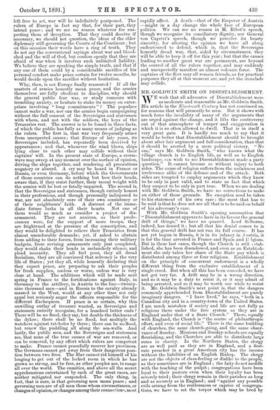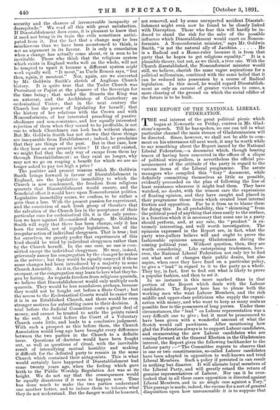MR. GOLDWIN SMITH ON DISESTABLISHMENT.
WE wish that all advocates of Disestablishment were as moderate and reasonable as Mr. G-oldwin Smith. His article in the Nineteenth Century has not convinced us, for reasons that will presently be seen. But it shows with much force the invalidity of many of the arguments that are urged against the change, and it lifts the controversy out of that atmosphere of temper and exaggeration in which it is so often allowed to dwell. That is in itself a very great gain. It is hardly too much to say that it would be better that Disestablishment should be brought about after fair argument and full consideration, than that it should be averted by a mere political victory. "No one," says Mr. Goldwin Smith, "who knows what the village church is to English life, as well as to English landscape, can wish to see Disestablishment made a party question." It cannot become so without injury to both sides. The cause of religion suffers from the unfairness and irrelevance alike of the defence and of the attack. Both sides are tempted to employ arguments which they know to be only in part valid, and to state as fact that which they suspect to be only in part true. When we are dealing with Mr. Gold.win Smith, we have no corrections to make on either of these grounds. No exception need be taken to his statement of his own case ; the most that has to be said is that he does not see all that is to be said on behalf of his adversary's case.
With Mr. Goldwin Smith's opening assumption that "Disestablishment appears to have in its favour the general drift of things," we have no quarrel. Lord Selborne, indeed, has denied it ; but all that his denial comes to is that this general drift has not run its full course. It has not yet begun in Russia, it is in its infancy in Austria, it is for the time arrested in France and Spain and L'Agium. But in these last cases, though the Church is still stab- lished, she has been disendowed, and even as an Establish- ment she only takes her share of the State pay which is distributed among three or four religions. Establishment on the principle of concurrent endowment is a wholly different thing from the exclusive establishment of a single creed. But when all this has been conceded, we have not got very far. A drift may be in a wrong direction, and so it may be a duty to resist it, or it may admit of being arrested, and so it may be worth our while to resist it. Mr. Goldwin Smith's next point is, that the dangers commonly apprehended from Disestablishment are purely imaginary dangers. "I have lived," he says," both in a Canadian city and in a country-town of the United States. I am much mistaken if society and life are not fully as religious there under the free system as they are in England under that of a State Church." There, equally with England, the Church is "the centre of philanthropic effort, and even of social life." There is the same building of churches, the same church-going, and the same obser- vance of Sunday. Missions and Sunday-schools are equally flourishing, and the Churches are able to distribute large sums in charity. In the Northern States, the clergy are as well paid as they are in England, and a. first- rate preacher in a great American city has the income without the liabilities of an English Bishop. The clergy are not the objects of class-feeling or dislike to the people, as they sometimes are in England ; the laity do not meddle with the teaching of the pulpit ; congregations have been loyal to their pastors even when their loyalty has been severely tried ; their clergy remain in their parishes as long .and as securely as in England; and "against any possible evils arising from the restlessness or caprice of congrega- tions, we have to set the torpor which may be bred by security and the chances of irremoveable incapacity or decrepitude." We read all this with great satisfaction. If Disestablishment does come, it is pleasant to know that it need not bring in its train the evils sometimes antici- pated from it. But the fact that a change may be less mischievous than we have been accustomed to think, is not an argument in its favour. It is only a consolation when a change has actually come about, or is seen to be inevitable. Those who think that the religious system which exists in England works well on the whole, will not be tempted to upset it because a different system might work equally well. "It naout," as Uncle Remus says, " but then, again, it moutent." Nor, again, are we converted by Mr. Goldwin Smith's sketch of Anglican Church history. It is quite true that the Tudor Church was Protestant or Papist at the pleasure of the Sovereign for the time being ; that under the Stuarts the King was an autocrat, and the Archbishop of Canterbury an ecclesiastical Vizier ; that in the next century the Church lost the power of legislating for herself; that the history of her relations with the Crown and with Nonconformists, of her interested preaching of passive obedience and non-resistance, and her equally interested rejection of them when they ceased to be profitable, is not one to which Churchmen can look back without shame.
But Mr. Goldwin Smith has not shown that these things are inseparable from Establishment ; indeed, he proclaims that they are things of the past. But in that case, how do they bear on our present action ? If they still existed, we might feel that the only way of escape from them lay through Disestablishment ; as they exist no longer, why may not we go on reaping a benefit for which we are no longer asked to pay too high a price ? The positive and present reasons which Mr. Goldwin Smith brings forward in favour of Disestablishment in England, are the legislative immobility to which the Church is now condemned, the freedom from religious quarrels that Disestablishment would ensure, and the beneficial effect it would have upon Nonconformist politics. Legislative immobility seems, we confess, to be rather a gain than a loss. With the present passion for experiment, and the conviction of each fresh group of theorists that the salvation of the Church lies in the acceptance of their particular cure for ecclesiastical ills, it is the only protec- tion we have against ill-considered change. Mr. Goldwin Smith will reply that there has been change, only it has been the result, not of regular legislation, but of the irregular action of individual clergymen. That is true ; but for ourselves, we greatly prefer that experiments of this kind should be tried by individual clergymen rather than by the Church herself. In the one case, no one is com- mitted except the individual clergyman. He may, indeed, grievously annoy his congregation by the changes he makes in the service ; but they would be equally annoyed if these same changes had been introduced by a majority in some Church Assembly. As it is, the clerical tyranny may soon be overpast, or the congregation may learn to love what theybe- gall by bating. As regards freedom from religious quarrels, we believe that Disestablishment would only multiply such quarrels. They would be less scandalous, perhaps, because they would not be fought out before a State Court ; but the access to the Ecclesiastical Courts would be easier than it is in an Established Church, and there would be even stronger motives for submitting cases to their decision. A trial before the Judicial Committee costs a great deal of money, and cannot be trusted to settle the points raised by the suit. A trial before the Court of a Voluntary Church costs little, and leads to a conclusive judgment. With such a prospect as this before them, the Church Association would long ago have brought every difference between the two parties in the Church to a definite issue. Questions of • doctrine would have been fought out, as well as questions of ritual, with the inevitable result of intensifying mutual hostility and making it difficult for the defeated party to remain in the same Church which contained their antagonists. This is what would certainly have happened if Disestablishment had come twenty years ago, when the feeling which gave birth to the Public Worship Regulation Act was at its height. We do not say that the consequences would be equally disastrous if it were to happen now. Time has done much to make the two parties understand one another better, and to induce them to tolerate what they do not understand. But the danger would be lessened, not removed, and by some unexpected accident Disestab- lishment might even now be found to be closely linked with Disruption. Those who fear this will hardly be in- duced to stand the risk for the sake of the possible influence which Disestablishment would exert on Noncon- formists. A Nonconformist minister," says Mr. Goldwin Smith, "is not the natural ally of Jacobins He is a Radical and a Home-ruler because it is from that party that he hopes to get religious equality." It is a plausible theory, but not, as we think, a true one. With the Church disestablished, the Nonconformist minister would still, we believe, cherish the same vague aspirations for a political millennium, combined with the same belief that it can be reduced into possession by a course of Radical legislation. In this mood, he would regard Disestablish- ment as only an earnest of greater victories to come, a mere clearing of the ground on which the social edifice of the future is to be built.



































 Previous page
Previous page